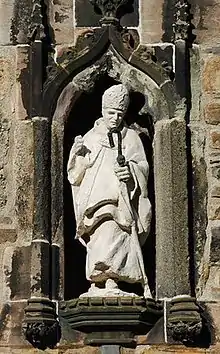Deiniol
Saint Deiniol (died 584) was traditionally the first Bishop of Bangor in the Kingdom of Gwynedd, Wales. The present Bangor Cathedral, dedicated to Deiniol, is said to be on the site where his monastery stood. He is venerated in Brittany as Saint Denoual. In English and Latin his name is sometimes rendered as Daniel.
Saint Deiniol | |
|---|---|
 Statue of Deiniol at Bangor Cathedral | |
| Abbot, Bishop | |
| Died | 584 Bardsey Island |
| Venerated in | Roman Catholic Church; Eastern Orthodox Church Anglican Communion |
| Major shrine | Bangor Cathedral, Bardsey Island |
| Feast | 11 September |
| Controversy | early life |
Life
According to a Latin Life of Deiniol, preserved in Peniarth MS226 and transcribed in 1602 by Sir Thomas Williams of Trefriw, he was the son of Abbot Dunod Fawr, son of Pabo Post Prydain. The family, having lost their land in the North of England, were given land by the king of Powys, Cyngen ap Cadell. Dunod embraced the religious life and founded the monastery at Bangor-is-y-coed on the Dee.[1]
Deiniol is said to have studied under Cadoc of Llancarfan. Sir David Trevor describes Deiniol as one of the seven blessed cousins who had spent part of his early life as a hermit "on the arm of Pembrokeshire" but was called to be a bishop despite deficiencies in his formal education.[1] Deiniol soon left Powys for Gwynedd where he founded the monastery of Bangor under the patronage of Maelgwn Gwynedd who endowed it with lands and privileges, later raising it to the rank of the official seat of a bishop, sharing a common boundary with the principality of Gwynedd. Deiniol spent the remainder of his days here as Abbot and Bishop.
He attended the Synod of Llanddewi Brefi in c. 545 with Saint David when the subject of rules for penance was being discussed. He was apparently consecrated in 545 by David. According to the Annales Cambriae Deiniol died in 584 and was buried on Bardsey Island.[2]
His cult in North Wales was quite extensive and several churches are dedicated to him, including Worthenbury near Wrexham and Hawarden, Flintshire in the north of Wales (as well as other churches in Flintshire). There are also dedicated churches at Llangarron, Llanfor, Llanuwchllyn, Eyton, and Itton; near Cardigan Bay there is a village of Llandeiniol - "parish of St Deniol" - which was once the name of Itton.[3]
Legacy
The churches of Hawarden and of Marchwiel are dedicated to Deiniol and there are also dedications at Itton in Monmouthshire and Llangarron in Herefordshire.
William Ewart Gladstone dedicated St Deiniol's Library, a residential library in Hawarden, Flintshire, for arts students, in 1896.
In the current Roman Catholic liturgical calendar for Wales[4] he is commemorated on the traditional date of 11 September.
His name has been given to the Deiniol Centre, a shopping centre in Bangor.
He may be referenced in the name of the hymn tune, ST. DENIO ("Immortal, invisible")[5]
References
- "St.Deiniol", Stories of the Saints, Oystermouth Parish, Swansea
- Martyrologium Romanum, 2004, Vatican Press (Typis Vaticanis), page 509.
- "Dmitry Lapa. Holy Hierarch Deiniol, Bishop of Bangor in Wales". OrthoChristian.Com. Retrieved 30 December 2018.
- National Calendar for Wales, accessed 6 February 2012
- Daw, Carl P. Jr (25 May 2016). Glory to God: A Companion. Westminster John Knox Press. ISBN 9781611646528.
Sources
- S. Baring-Gould and John Fisher. (1908). The Lives of British Saints
- C.J. Clark. The Saints of Wales and Cornwall and such Irish Saints as have dedications in Britain
Further reading
- Charles-Edwards, T. M. (2004). "Deiniol (d. 584)". Oxford Dictionary of National Biography. Oxford University Press.